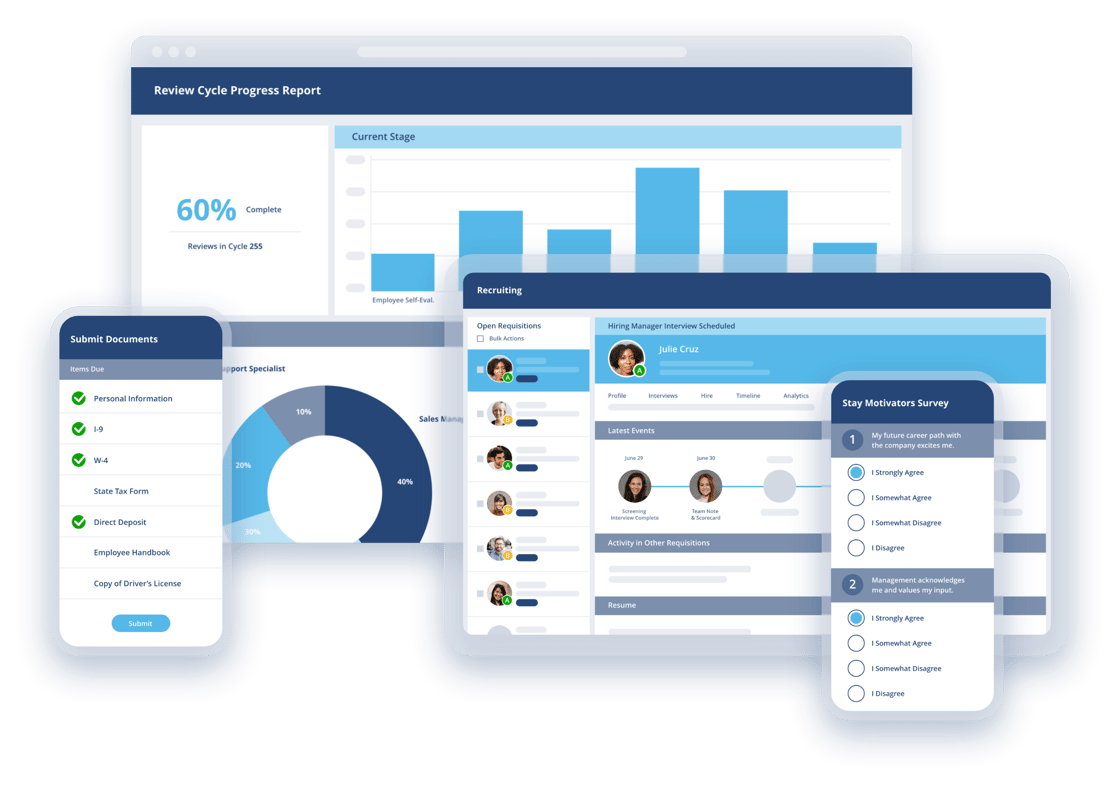Talent management refers to your company’s processes for hiring, engaging, developing, and retaining employees and planning for future workforce needs. There are strategic and administrative components of talent management — all handled by human resources teams whose plates are fuller than ever. Talent management statistics show that, on average, there are just 1.4 HR workers per employee.
HR Terms to Know
Don’t confuse these HR terms: Talent Acquisition vs. Talent Management
Fortunately, with technology, small HR teams can do more with less. Managing talent holistically with technology:
- Enables the creation of cohesive, engaging candidate and employee experiences
- Empowers HR teams with more time and increased insight via automation, data analytics, and more
- Increases HR’s understanding of the workforce, which leads to more effective people strategies and better company performance
Why technology is necessary for effective talent management
Today, whether you’re at work or home, few situations don’t involve at least some use of technology. Technology automates the boring tasks monopolizing our valuable time and attention so we can regain focus on what matters most. Technology’s biggest benefit — the reason it’s no longer an option but a necessity — is its (literally) superhuman ability to collect and analyze data. There’s just no way humans can match its efficiency, memory, accuracy, analysis, and reporting capabilities.
And with so many robust talent management software systems on the market, there’s no reason to try. Talent management technology is the all-in-one solution for teams that want to streamline core HR functions and cut down on the number of software systems they’re using. It’s also essential for companies that want to keep up — 46% of HR leaders say they’re spending more on HR technology in 2023.
46% of HR leaders are spending more on #HRtechnology — find out how it can empower your #TalentManagement strategy:Keep reading for a closer look at the advantages of using technology to handle your talent management processes.
8 ways technology benefits your talent management strategy
Using an end-to-end talent management solution is a proven, effective way to enable HR efficiency at every stage of the employee journey.
1. Improves recruitment processes
Recruiting candidates involves many tedious tasks that can bog down talent acquisition teams and get lost in the shuffle. 69% of HR professionals said automation saved them significant time during the hiring process.
The best talent management systems include an applicant tracking system (ATS) equipped with tools to help recruiters save time and focus on their candidates:
- Text applications attract more candidates
- Centralized job board management and AI-assisted job descriptions facilitate faster hiring
- Interview scheduling coordinates multiple participants’ schedules automatically
2. Enhances candidate experience
ClearCompany Cuts Hiring Time By Weeks
ClearCompany recruiters are hiring in around 21 days compared to the industry average of more than 45 days thanks to our Talent Management software — find out how.
The candidate experience is arguably the most important part of the employee lifecycle. It needs to be seamless and straightforward, or you risk losing top talent. 83% of employees say a negative candidate experience turned them off from a job they were interested in.
Technology powers a consistent, candidate-centric hiring experience. Form a strong foundation for your future employees with technology tools for the candidate experience:
- Texting tools for fast communication with recruiters
- Interview links ensure candidates get the correct information from recruiters
- Fair and fast interview processes that are weeks faster than the competition
3. Simplifies employee onboarding
The onboarding stage of talent management is relatively brief, but it benefits greatly from technology. Onboarding has always involved lots of paperwork and repetitive data entry — from signing employment verification forms and company policies to filling out tax documents and payroll information.
Talent management technology enables digital onboarding processes that impress and engage your new hires:
- Integration with ATS for a smooth transition from candidate to new hire
- Self-service employee portals for paperwork, company resources, and team introductions
- E-signatures for quick form completion and paperless HR processes
4. Enables employee-focused performance management
Our understanding of how to manage employee performance has changed rapidly over the last few years. A tech-powered approach to performance management centers your employees and utilizes data to help your team develop strategies that work.
When you manage performance with technology, your HR team can:
- Design a fair, standardized performance review process
- Effortlessly establish digital performance records
- Set, track, and give feedback on employee goals
- Analyze performance data to spot issues, reward high performers, and enable productivity
5. Facilitates internal mobility
Attract and retain employees with opportunities for internal mobility. With access to performance data, you can quickly spot your top performers across the company. That allows you to identify good candidates for promotions, give rewards and recognition, and offer competitive compensation and benefits to keep your best employees around long-term.
Internal mobility can also include non-linear career paths. Technology gives you visibility into employees with skills that may be a better fit for another role in your organization.
6. Simplifies succession planning
Think of the roles your organization can’t operate without. Do you have a plan of action if those essential roles become vacant unexpectedly? What about in the case of resignation or retirement? Have you created career paths to promote employees internally and motivate growth and retention?
If you haven’t tackled succession planning, talent management technology can help. Your performance data helps you easily spot top performers and employees with the right skills for your critical roles.
7. Increases employee engagement
Talent management includes employee engagement, and there are tech tools to help with that:
- Pulse surveys allow HR to get a quick look at engagement levels
- Dive deeper into specific topics like employee well-being and diversity, equity, inclusion, and belonging with longer surveys
- Motivate employees by recognizing great work and big milestones
8. Allows for more accurate workforce planning
Employee goal achievement determines whether or not the business reaches its goals. If your company doesn’t have the right number of fully productive employees, business goals often suffer. But the number of fully productive employees on staff can vary widely depending on engagement levels, new hires, employees nearing retirement, and other factors.
Headcount planning protects your company from the negative effects of employees that are not productive. It allows your HR team to facilitate productivity by hiring the right people at the right time across the organization.
Trends to watch in talent management technology
Technology moves fast — be sure your business keeps up with the trends for cutting-edge talent management technology.
HR automation
Automation is already changing the way HR professionals handle repetitive work. You can improve your talent management strategy and free up valuable time by automating tasks like:
- Sending reminders for interviews and performance reviews
- Email and text message responses with templates
- Transferring employee data into payroll systems
Optimizing existing HR tech
According to SHRM, integrating existing tools into effective tech stacks is a top priority for HR leaders this year. Reevaluate your tools and look for data silos, wasted HR budget, and underutilized software to get the most out of your investments.
Employee experience
Companies need to meet employees’ expectations today, which includes seamless, tech-powered processes. HR teams are using talent management technology to provide the modern employee experience the workforce expects. Digital processes empower employees and make life easier for HR, too. For example, self-service portals allow employees to take charge of onboarding, goal-setting, and performance reviews and give them access to resources to reduce HR requests.
Artificial Intelligence (AI)
We’re at the forefront of its adoption in the workplace, but AI has quickly established its usefulness for HR teams. Talent management technology leverages AI to assist with writing job descriptions, identifying skills gaps, and building email drip campaigns.
Technology is necessary for talent management teams that want to attract qualified candidates, increase productivity, and build resilient, engaged teams. Technology enables you to learn from your HR data and deeply understand the employee experience so you know how to best improve it. You can also use your data to plan and protect your business against unpredictable but not uncommon events like involuntary employee turnover.
If you want to learn more about talent management technology, upgrade your system, or optimize your current HR software, check out ClearCompany’s latest guide, How to Consolidate Your HR Software Stack and Boost Productivity.
A complete talent management platform enables employee-centered, productivity-driving processes. Get a glimpse of the immense benefits technology can bring to your business and the competitive advantage it offers.
Download your copy of ClearCompany’s guide to optimizing your HR tech stack to see technology’s impact and learn:
- Why optimizing your HR tech stack matters now
- Actionable steps to take to find the right HR software
- Ways to maximize and maintain your tech stack



